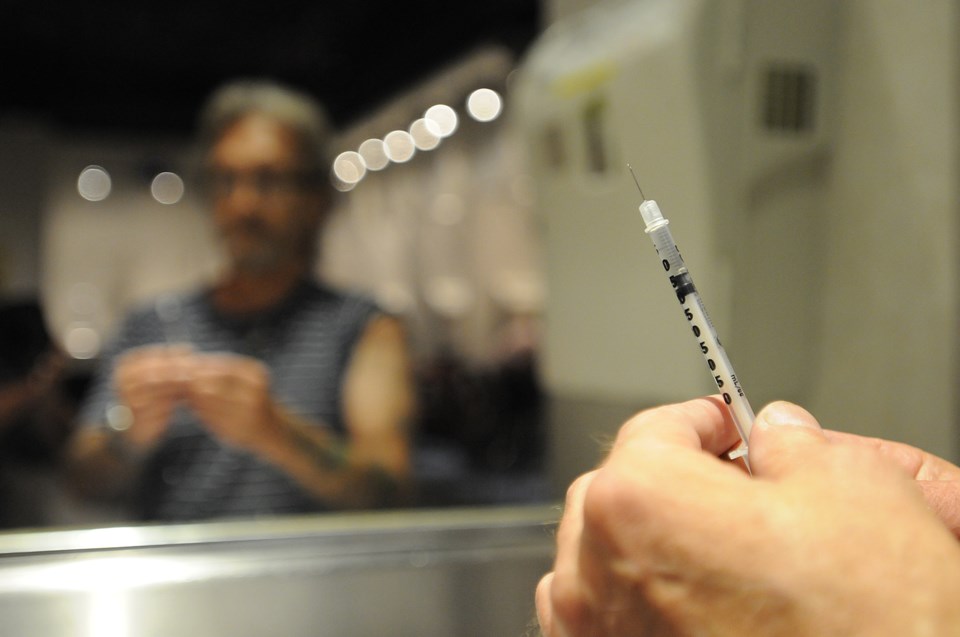So maybe you’ve already had enough of this civic election campaign.
Or maybe you don’t even know it’s going on.
It is, after all, a bit of a snoozer.
But if you’re paying attention, or read some of my stories from the campaign trail, you know that affordability, homelessness and transit are issues dominating the press conferences and public forums.
But what about this city’s little problem with drug addiction?
I’ve been on the beat long enough to remember when addiction was really the only issue when COPE’s Larry Campbell took on the NPA’s Jennifer Clarke in the 2002 race.
Campbell was pushing for a supervised drug injection site and spent a great deal of time telling the public and reporters why it was needed; he knew what he was talking about since he was the province’s chief coroner in the mid-1990s when upwards of 200 people per year died of drug overdoses.
I recall Clarke, who supported the Four Pillars drug strategy of prevention, education, enforcement and treatment, saying that Campbell was running to be mayor of the Downtown Eastside while she wanted to be mayor of Vancouver. Campbell won in a landslide and the Insite supervised injection site opened in September 2003. Clarke, by the way, is now seeking the Conservative Party’s nomination in the new federal riding of Vancouver-Granville, which is interesting since Prime Minister Stephen Harper hasn’t exactly been supportive of Insite and harm reduction.
Anyway, here we are in the fall of 2014 and drug addiction is still an issue.
Some recent evidence: Vancouver Coastal Health tells me that over a four day period this month at Insite, 31 people overdosed at the facility but survived.
That bit of news came the same week that members of the Vancouver Police Board heard from the VPD’s director of planning and research that car break-ins were up by 27 per cent across the city.
This is what Deputy Chief Doug LePard told the board about the spike: “Theft from autos are driven by a high number of people with drug addictions that we have in the city.”
He continued to say that it’s not a crime that’s “going to be solved with policing because even when we’re at maximum effectiveness [of reducing thefts] the problem is they’re out [of jail] very quickly and they commit so many crimes a day.”
LePard, again, said the underlying problem is addiction.
Mayor Gregor Robertson, who doubles as chairperson of the police board, put a task force together on mental health and addictions over the last year and a report went before council last month that outlined 23 “priority actions” including the need for 300 long-term treatment beds.
Which is something.
But, unlike Campbell and Sam Sullivan (who wanted to reduce the open drug market by 50 per cent), the mayor has not made tackling drug addiction a central plank of his campaign.
The NPA’s Kirk LaPointe has also not directly addressed the issue of drug addiction. Instead, he has promised an audit of the millions of dollars being poured into the Downtown Eastside.
I haven’t heard much from COPE’s Meena Wong on the topic, either. But I will ask her Friday when she sits down with the Courier for an interview, which will be livestreamed on our website at noon.
I know what some of you are thinking: It’s a fact that many homeless people end up on the streets because of a mental health or an addiction issue, or both. So when politicians talk about ending homelessness, they also mean getting a handle on drug addiction.
Maybe.
But why isn’t anybody talking specifically about the open drug market that persists in the Downtown Eastside? What happened to all that talk about the Four Pillars drug strategy? The Vancouver Agreement, anybody?
In Larry Campbell’s inauguration speech in 2002, he said “if we do our work well, we should be able to eliminate the open drug market on the Downtown Eastside by the next election.”
That, obviously, hasn’t happened.
Maybe by next election.
Oh, and this: The gunman who shot Cpl. Nathan Cirillo at the National War Memorial in Ottawa Wednesday had an addiction to crack cocaine, according to court records released to media this week. That revelation came after Vancouver police arrested him in 2001 on an attempted robbery at the McDonald's restaurant at Main and Terminal.
twitter.com/Howellings



